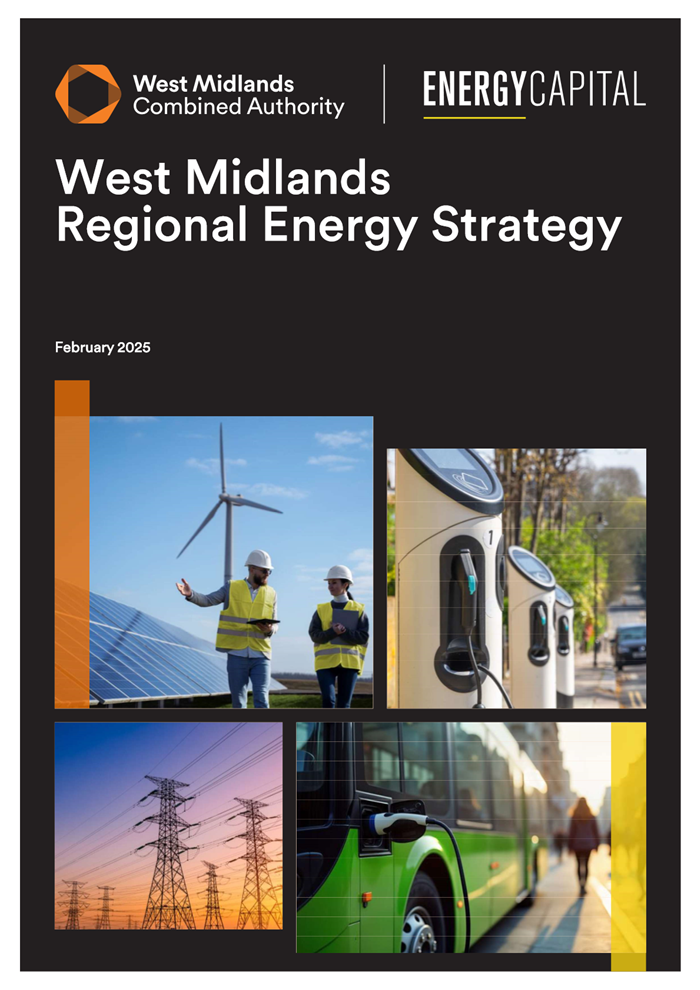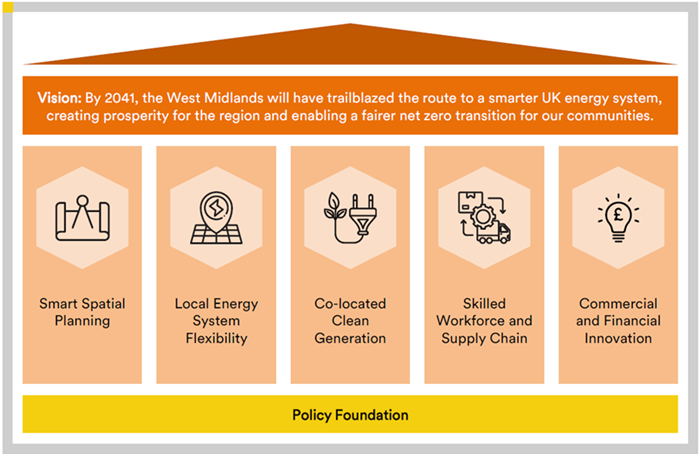Regional Energy Strategy
On 7th February 2025, the WMCA Board endorsed the refreshed West Midlands Energy Strategy. We will be producing sector briefings in the coming months to communicate the implications of the strategy for housing, industry and transport.

Executive Summary
Since the first West Midlands Regional Energy Strategy was produced in 2018, several major changes have occurred, that have a profound impact on the energy system of the region.
- Addressing climate change has become increasingly urgent, leading to the region’s commitment to reaching net zero by 2041, and a much more ambitious pathway to energy decarbonisation being needed.
- In just eight years, devolution has gone from establishing the West Midlands Combined Authority (WMCA) to securing a Trailblazer Devolution Deal with the Government to pilot a single integrated settlement including retrofit funding, with new powers on energy and net zero confirmed in the 2025 Devolution White Paper.
- The West Midlands has built a strong track record of effective collaboration, from the consortium approach to retrofit delivery to innovation projects of national significance.
- And now, through collaboration with the new National Energy Systems Operator (NESO), the region can ensure that Regional Energy Strategic Planning takes a place-based, whole system approach to planning for energy infrastructure, breaking down siloes and giving better visibility of what energy is needed where and when, to facilitate investment.
This strategy sets out how West Midlands leaders and communities can take advantage of these changes. By working in partnership with industry, Ofgem, NESO, Great British Energy, the National Wealth Fund, and central Government, the region can become the national trailblazer for smart energy systems. This will support the Government’s Clean Energy Superpower Mission, as well as local and national objectives to grow and transition our economy, reduce fuel poverty and support a health system that is fit for the future, and build a fairer society that has better access to training and jobs.
The West Midlands will continue to pioneer a smart approach to the energy transition that:
- Delivers net zero
- Reduces energy costs
- Creates investment opportunities
- Ensures a just transition for our businesses and communities
This strategy focuses on five strategic priorities:
Smart Spatial Planning
Ensuring that energy system planning is joined up with transport and spatial planning to enable the region to achieve its clean growth objectives.
Local Flexibility
A smarter energy system requires technologies that enable energy generation and demand to be balanced more effectively. This strategy will set out how the benefits of flexibility can be retained locally to support the decarbonisation of our built environment and transport systems.
Co-located Clean Generation
Ensuring that renewable energy generation can increase within the West Midlands, by locating it close to demand, to avoid putting pressure on the electricity network.
Skilled Workforce and Supply Chain
Ensuring that the West Midlands is recognised as a hub of energy systems expertise, playing its part to make the entire UK energy system smarter, and growing sustainable demand for local supply chains to develop, integrated with skills and training offers.
Commercial and Financial Innovation
Directing the region’s innovation efforts towards creating business models and finance products that help to overcome barriers and accelerate the delivery of smart energy systems.
This will not be possible to deliver without extensive collaboration between public and private sectors, education providers, community groups and other partners committed to realising a shared vision. The Energy Capital Partnership remains as critical as ever to enabling the strategy’s delivery. By working together towards shared goals, the West Midlands can make the necessary changes more quickly, at lower cost, and ensuring that communities retain greater benefit locally.

Structure of the West Midlands Regional Energy Strategy
